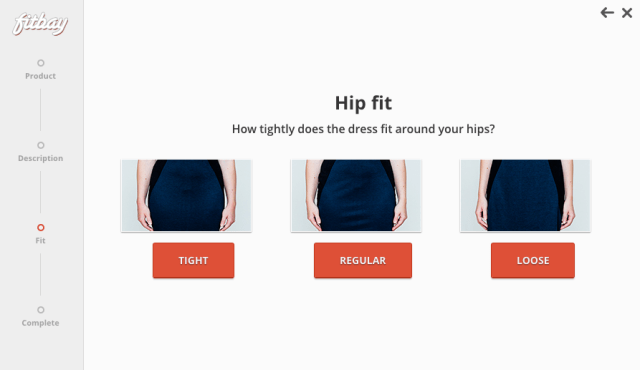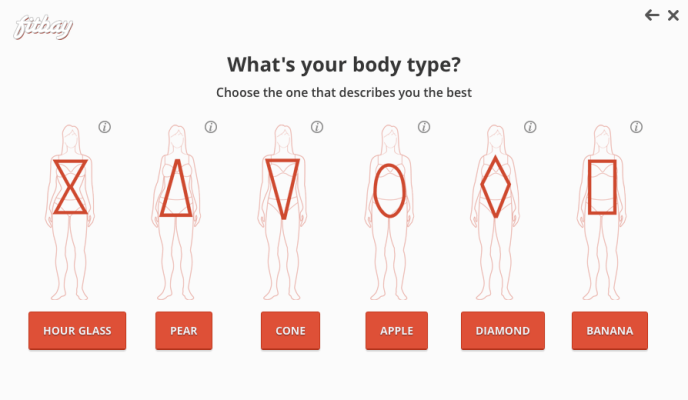European startup Fitbay, another business taking aim at the thorny problem of virtually trying on clothes to grease the wheels of sartorial ecommerce, has attracted a $400,000 early stage investment from Jesper Buch (founder of Just-Eat) and Nordic VC firm Creandum. Fitbay is based in Copenhagen, Denmark, and launched a closed beta late last year.
The round is Fitbay’s first external funding — the startup was bootstrapping for the seven months since being founded, back in May 2013 — and CEO Christian Wylonis describes it as an angel round. He tells TechCrunch the new funding will be used to carry the business through its closed beta phase (which is likely to continue for another six to eight weeks).
“It will primarily be financing product development — both the core team and a 2-3 additional hires. This includes both our web and mobile product. We are expecting our iOS app to launch in April 2014,” he says.
“We plan to onboard about 1,000 users (the preregistration is already oversubscribed) over the next 4 weeks. Then we will start opening up to more users. We are actively looking for the best people to onboard early that are very interested in the concept. We look a lot at the amount of garments that preregistered users have added to gage their interest.”
Fitbay’s answer to the clothing fit problem — and indeed the tedium of online clothes shopping — is to personalise clothes suggestions based on other users with similar size and body shape, so there’s a better chance garments will fit and not have to be sent back as unsuitable.
As noted above, it’s currently only accepting users via invite. Those who apply to sign up for the service can take a body shape quiz to improve Fitbay’s garment suggestions, which asks them to select what they believe is their body shape from a range of options (some pretty established shapes, some not so much…) such as apple, pear, cone and er, banana.
The quiz also includes questions about the length of body parts such as upper body and arms, and asks users to specify brands they like and provide details of garments that do fit them (and specify how tightly these items fit in certain areas).

Fitbay’s sartorial recommendation element is not just about self-described body shape; it has a social aspect too — hence the talk of community — being as Fitbay users only see products recommended by other users who share the same height, weight, and body type.
So if you’re tall and thin, it’s presupposing you’ll want to dress like other tall waifs. And so on.
The startup claims some 40% of all clothes sold online are returned because of product size and fit issues. Which is a big but not unsurprising statistic. Although clothes that do fit don’t always suit — so that more intangible ‘is this my style?’ question is another challenge for online clothes retail and for startups in the online fitting room space to figure out.
Still, there’s no doubt that returns specifically because of size/fit issues are a huge cost to the online clothes selling industry so any startup that can get some success with a method for cost-effectively shrinking returns has the potential to build a sizeable business in the virtual fitting room space.
There are, of course, lots of competitors attacking the online clothing size/fit problem — often taking very different approaches, such as Fits.me‘s robot-mannequins, or Metail‘s computer vision tech. Others in the space include Virtusize, True Fit, Clothes Horse and Fitiquette (now owned by Indian ecommerce company Myntra), to name a few.
Fitbay flags up that it doesn’t require users to take measuring tape to parts of their body to get recommendations (although its optional body size quiz does take some time and ask some pretty specific size/shape assessment questions).
Nor does it use any analysis software (which presumably keeps its costs down). It’s building a data-base of approximate “body doubles”, and using the principles of crowdsourcing and community to help similar-sized people work out what fits them.
“There are… a lot of different ‘size estimator widgets’ e.g. TrueFit, Virtusize and Fits.me but we are focused on helping users find clothes that fit instead of helping users determine their size in a certain brand,” says Wylonis.
“As far as we know we don’t have any direct competitors for a ‘discovery site for finding clothes that fit’. There are a lot of competitors in “general” fashion discovery e.g. Pinterest, Lyst and Fab but we have a very different value proposition – being a platform that helps people discover clothes that fits their body type.”
Commenting in a statement on what attracted him to invest in Fitbay, Buch also flagged up Fitbay’s crowdsourcing approach. ”The unique thing about Fitbay is that the social shopping experience becomes more relevant when it is between people who have the same body. The biggest issue with social shopping today is that clothes recommended by someone who is 180 cm and 80 kg is not very relevant to someone who is 160 cm and 50 kg,” he said.
Fitbay’s founding team includes Wylonis — previously an Associate at Creandum (the other investor in Fitbay’s angel round); along with fellow co-founders Andreas Jarbol, Philip Wylonis, Michael Wolthers Nielsen, and Troels Reese Christensen.
